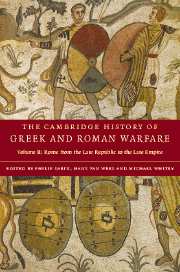Book contents
- Frontmatter
- Part I The Late Republic and the Principate
- 1 International relations
- 2 Military forces
- 3 War
- 4 Battle
- 5 Warfare and the state
- 6 War and Society
- Part II The later Roman Empire
- Chronological table
- Glossary
- List of ancient authors
- Bibliography
- Index of ancient passages cited
- General index
- Map 6. The provinces under Trajan."
- References
6 - War and Society
from Part I - The Late Republic and the Principate
Published online by Cambridge University Press: 28 March 2008
- Frontmatter
- Part I The Late Republic and the Principate
- 1 International relations
- 2 Military forces
- 3 War
- 4 Battle
- 5 Warfare and the state
- 6 War and Society
- Part II The later Roman Empire
- Chronological table
- Glossary
- List of ancient authors
- Bibliography
- Index of ancient passages cited
- General index
- Map 6. The provinces under Trajan."
- References
Summary
This chapter has two main themes: the impact of society and social structures on the conduct of war, and the reciprocal effect of war on society. It concentrates on the changing character of external wars in the late Republic, the pressures which this caused in Rome and Italy, both politically and socially, and how these were eventually to lead to internal or civil wars which tore the Roman Republic apart. The imperial system which grew out of these struggles, and which in many ways was their logical outcome, saw radical change. Warfare again changed in character and purpose, if it is true that the reign of Augustus saw the end of imperial expansion. Political and social structures are at the heart of both the extreme belligerence of Rome in the late Republic and the relatively peaceful years of the Principate, the pax Romana. There is certainly a reciprocal effect: warfare and imperialism had a profound effect on the society of Roman Italy. The massive influx of wealth into Italy during the third and second centuries bc might have continued into the first century bc, but with it came severe political and social tensions. It is impossible to separate army and politics in the late Republic or Principate, but under Augustus the character of the army changed radically from that of a non-professional citizen army to a professional standing army. Links between war and social change were as much a part of the Roman revolution as anything else: ‘as states change their nature, so will their policy change, and so will their wars’.
Keywords
- Type
- Chapter
- Information
- The Cambridge History of Greek and Roman Warfare , pp. 198 - 232Publisher: Cambridge University PressPrint publication year: 2007
References
- 4
- Cited by

